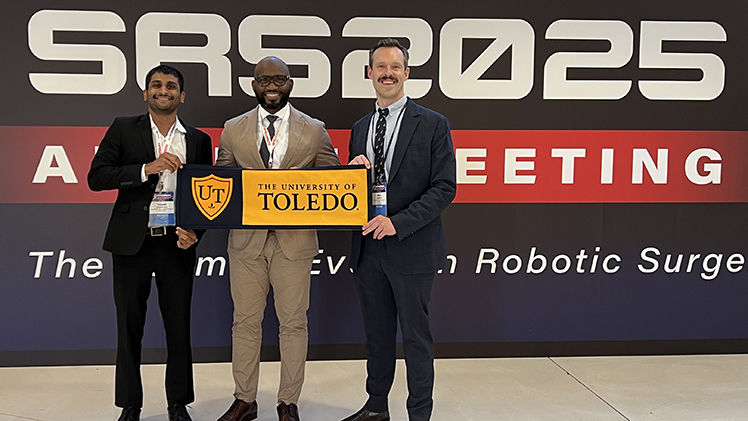A pair of second-year medical students at The University of Toledo studying how well artificial intelligence can answer patients’ questions about highly advanced surgical procedures recently presented their work at a major international conference in France.
Tarak Davuluri and Paul Gabriel were among the small number of U.S. medical students selected to participate in the 2025 Society of Robotic Surgery Annual Meeting.

Second-year medical students Tarak Davuluri, left, and Paul Gabriel, right, traveled to France with Dr. Obi Ekwenna, center, last month to present research on artificial intelligence in patient education.
The event, held last month in Strasbourg, focused on the future of telesurgery, the evolution of minimally invasive surgical techniques and how artificial intelligence is being integrated into healthcare. It drew more than 2,500 healthcare professionals from more than 70 countries around the world.
“It was almost surreal when we first got there,” Davuluri said. “We knew it was an international conference but I don’t think either of us really appreciated just how international it was. The top minds in the field from every continent were there. It was a great experience and was really inspiring for both of us.”
Davuluri and Gabriel presented a pair of abstracts on the application of artificial intelligence in patient education for urologic procedures, looking at the quality, clarity and reliability of answers provided by AI chatbots ChatGPT and Gemini in response to representative patient questions.
The project led by Davuluri focused on urological telesurgery in general, while the project led by Gabriel specifically looked at robotic-assisted radical prostatectomy.
Both studies found AI provided answers that were accurate and understandable, though the responses were limited in providing actionable information.
“In the future so many patient decisions are going to be led through artificial intelligence,” Gabriel said. “It’s important that the information they provide is correct, but it’s also important that patients are getting insights that help them understand what to do next. Our research found that’s where AI is lacking.”
Dr. Obi Ekwenna, an associate professor of urology in the College of Medicine and Life Sciences and a co-author on both abstracts, said Davuluri and Gabriel’s work is among the first to evaluate how large-language-model chatbots answer patient questions on telerobotic surgery.
“It’s a topic that dovetailed perfectly with the meeting’s AI focus and their participation in this conference highlighting the caliber of scholarship emerging from the College of Medicine and Life Sciences,” he said. “This was a great opportunity to get our students represented on a global stage.”
Ekwenna, a UToledo Health transplant and urologic surgeon, also presented on robotic-assisted deceased donor kidney transplantation. Ekwenna performed the first robotic-assisted living donor transplant at the University of Toledo Medical Center in 2022.
“Surgical technology is advancing rapidly. Telesurgery is here. AI is going to become a larger and larger part of medicine,” he said. “It’s critical that we embrace these advancements, but also that we’re examining how this affects patients and their understanding of these procedures.”
Davuluri is currently working toward submitting his research to an academic journal, while Gabriel is looking to expand his project to also explore how the specific questions asked by patients affects the type of answers the receive.